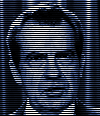Richard M Nixon
 1913-1994
1913-1994Vice President 1958-1961 President 1969-1974 Nixon played a prominent role in Vietnam between 1954 and 1974. Even before his presidency, Nixon was actively engaged in policy making. As president, he directed attention away from the war with his program of gradually withdrawing US ground troops and turning the conflict over to the local Vietnamese governments. At the same time, he stepped up the bombing campaigns over North Vietnam and some of the heaviest fighting of the war occurred under his leadership. Nixon was secretive and insecure and feared the anti-war movement; he was also a renowned anti-Communist. Having seen what the war had done to the Johnson presidency, he tried very hard to play down the importance of the war. In 1969, he promised to begin reducing the US ground forces, but also authorized secret bombings of Cambodia, to stop the flow of supplies along the so-called Ho Chi Minh trail. Nixon also ordered the secret infiltration of the anti-war groups to disrupt their activities. He used the National Guard to stop the public demonstrations and at Kent State University in Ohio, four students were shot to death. The aftermath made Nixon realize that he had to end the war before the upcoming election in 1972. The Paris peace talks had been going on for a while and Henry Kissinger was threatening the North Vietnamese with ferocious bombings and at the same time trying to negotiate a peace settlement. As Nixon visited China in 1972, the Vietnamese launched one of their largest ever attacks (The Easter Offensive) with 120,000 men pushing within 100 kilometers (55 miles) of Saigon. There were only 100,000 US personnel remaining in Saigon and of these, only 6000 were combat soldiers. Nixon ordered Operation Linebacker, the largest bombing campaign since 1968 with B-52's bombing Hanoi. Peace talks finally moved forward in August 1972. Kissinger negotiated intensely, and by late October he announced that peace was at hand, this helped Nixon win his re-election. In December of that year, Nixon initiated Operation Linebacker II and once again he began bombing North Vietnam with more bombs in a 12-day period, than the total dropped between 1969 and 1971. The Vietnamese and Kissinger returned to the negotiating table in Paris and finally, on January 27th, 1973 the Paris Peace Accords were signed, against the will of South Vietnam. Nixon's years in office saw some of the heaviest fighting during the war with 20,553 US soldiers, along with 107,000 ARVN and an estimated 500,000 North Vietnamese and Vietcong being killed in action. The Cease-fire saw the withdrawal of US forces from Vietnam and lasted for two years until South Vietnam was conquered in April 1975. The Watergate scandal eventually forced Nixon to resign in 1974. |